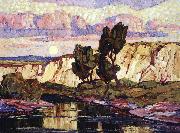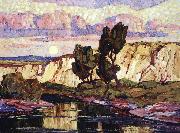Sven Birger Sandzen Oil Painting ReproductionAll Sven Birger Sandzen Oil Paintings(5 February 1871-19 June 1954), known more commonly as Birger Sandzen, was a Swedish-American painter best known for his landscapes. He produced most of his work while working as an art professor at the Bethany College, Lindsborg, Kansas. Sandzen was born in Blidsberg, Ulricehamn Municipality, Västra Götaland County, Sweden, the son of a Lutheran minister and his wife, an accomplished watercolorist. A protege of Anders Zorn, Sandzen showed an interest in art at from early age, and at the age of 10 joined Cathedral School (Katedralskolan) situated in Skara, to study art under the tutelage of Olof Erlandsson, a graduate of the Royal Swedish Academy of Arts. After graduating in 1890, Sandzen studied for a short time at the University of Lund before moving to Stockholm. It was his intention to enroll at the Royal Swedish Academy of Arts. However, the waiting list proved too long for him. Instead, he sought out and joined a group of young artists who were studying under Anders Zorn, Richard Bergh and Per Hasselberg. This group would later be known as the Artists League (Konstnärsförbundet).At the end of his studies, Zorn and Bergh recommended that Sandzen complete his painting studies in Paris. In 1894, Sandzen left Stockholm to study under Edmond Aman-Jean who introduced Sandzen to pointillism. |
|||

|
|||
|
|
|||
|
||||||||
| Sven Birger Sandzen (5 February 1871-19 June 1954), known more commonly as Birger Sandzen, was a Swedish-American painter best known for his landscapes. He produced most of his work while working as an art professor at the Bethany College, Lindsborg, Kansas. Sandzen was born in Blidsberg, Ulricehamn Municipality, Västra Götaland County, Sweden, the son of a Lutheran minister and his wife, an accomplished watercolorist. A protege of Anders Zorn, Sandzen showed an interest in art at from early age, and at the age of 10 joined Cathedral School (Katedralskolan) situated in Skara, to study art under the tutelage of Olof Erlandsson, a graduate of the Royal Swedish Academy of Arts. After graduating in 1890, Sandzen studied for a short time at the University of Lund before moving to Stockholm. It was his intention to enroll at the Royal Swedish Academy of Arts. However, the waiting list proved too long for him. Instead, he sought out and joined a group of young artists who were studying under Anders Zorn, Richard Bergh and Per Hasselberg. This group would later be known as the Artists League (Konstnärsförbundet).At the end of his studies, Zorn and Bergh recommended that Sandzen complete his painting studies in Paris. In 1894, Sandzen left Stockholm to study under Edmond Aman-Jean who introduced Sandzen to pointillism. |
||||||||
|
|
||||||||
| Gemälde IDENTIFIZIERUNG:: 71391 Creek at Moonrise ca. 1921(1921) Oil on canvas 91.1 x 122 cm (35.87 x 48.03 in) |
||||||||
|
|
||||||||
| Gemälde IDENTIFIZIERUNG:: 72500 Creek at Moonrise 91.1 X 122 cm (35.87 X 48.03 in) cyf |
||||||||
|
|
||||||||
|
| VORHERIGER KÜNSTLER NÄCHSTER KÜNSTLER | |||||||
|
|
||||||||
|
Sven Birger Sandzen (5 February 1871-19 June 1954), known more commonly as Birger Sandzen, was a Swedish-American painter best known for his landscapes. He produced most of his work while working as an art professor at the Bethany College, Lindsborg, Kansas. Sandzen was born in Blidsberg, Ulricehamn Municipality, Västra Götaland County, Sweden, the son of a Lutheran minister and his wife, an accomplished watercolorist. A protege of Anders Zorn, Sandzen showed an interest in art at from early age, and at the age of 10 joined Cathedral School (Katedralskolan) situated in Skara, to study art under the tutelage of Olof Erlandsson, a graduate of the Royal Swedish Academy of Arts. After graduating in 1890, Sandzen studied for a short time at the University of Lund before moving to Stockholm. It was his intention to enroll at the Royal Swedish Academy of Arts. However, the waiting list proved too long for him. Instead, he sought out and joined a group of young artists who were studying under Anders Zorn, Richard Bergh and Per Hasselberg. This group would later be known as the Artists League (Konstnärsförbundet).At the end of his studies, Zorn and Bergh recommended that Sandzen complete his painting studies in Paris. In 1894, Sandzen left Stockholm to study under Edmond Aman-Jean who introduced Sandzen to pointillism. |
||||||||
|
|
||||||||
|
KONTAKTIEREN Sie UNS |







